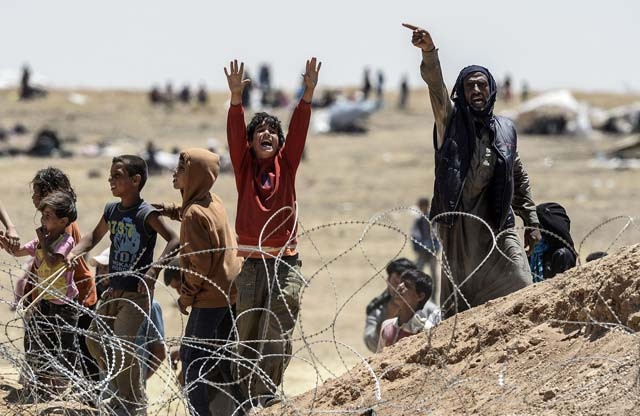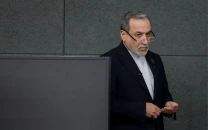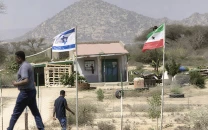Delivering healthcare in Syria 'almost impossible': WHO
Of the 113 fully operational hospitals in Syria before the conflict began in 2011, 58 per cent are now closed

In a picture taken from Akcakale in Turkey, Syrian refugees gesture as they ask for water at the Turkish border near the Syrian town of Tal Abyad, on June 13, 2015. PHOTO: AFP
"Access is the principal concern," said Elizabeth Hoff, the WHO's representative in war-shattered Syria.
"Operating in a conflict like Syria is almost an impossible situation in very many hot areas," she told reporters.
Hoff stressed the challenges of getting access and supplies to patients across the country, including in areas controlled by the government and opposition forces.
But, as expected, IS-controlled areas pose the greatest difficulties, she said, citing recent estimates that 1.7 million people were living in territory held by the group.
The WHO has no contact with IS, but Hoff told journalists the organisation does work with doctors based in areas under IS control, who have relayed messages from the extremists.
"We have actually transported medicine in, but not in large quantities," she said, referring to IS territory.
US air strike targets 'Jihadi John' in Syria: Pentagon
Nationwide, the toll of injured is rising by roughly 25,000 each month, Hoff said, adding that it was impossible to break down that figure between combatants and civilians.
Of the 113 fully operational hospitals in Syria before the conflict began in 2011, 58 per cent are now closed or functioning at a diminished capacity, she explained.
Those that are functioning face limited electricity supply and enormous staffing problems, as many of Syria's medical professionals have fled the country, the WHO official further added.
According to Hoff, the full impact of the healthcare crisis in Syria was not evident through the initial stages of the conflict, because the country "had the strongest health indicators in the Arab world."
But the relentless fighting has destroyed many of the systems that were in place.
"The national surveillance system has broken down," she said.



















COMMENTS
Comments are moderated and generally will be posted if they are on-topic and not abusive.
For more information, please see our Comments FAQ